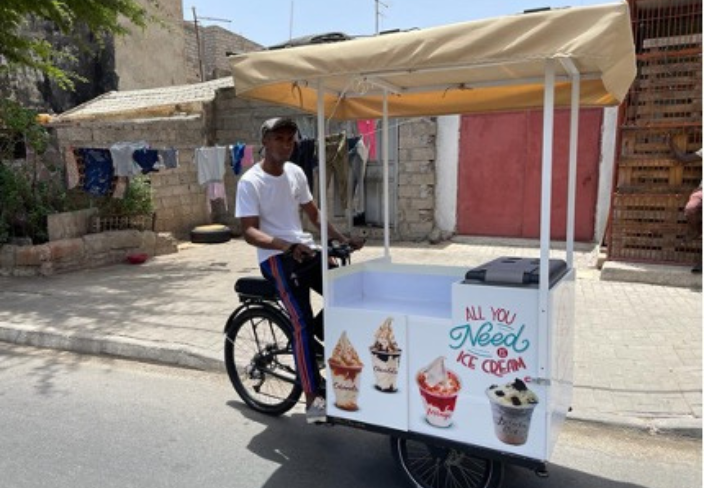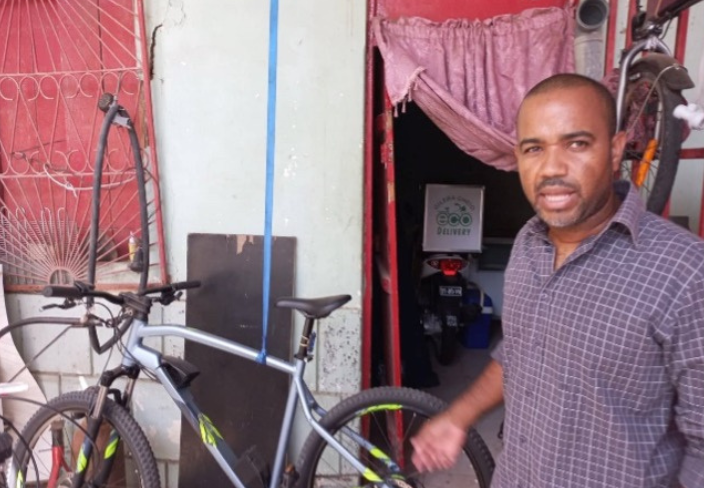Faces of Climate Change
Smart mobility, clean energy
October 28, 2022
This blog is the third in a series of blog and other communication materials that the UNDP Cabo Verde Accelerator Lab will produce on climate change and its impact on people's lives, especially people from the most vulnerable communities.
Author: Samory Araújo, Head of Solutions Mapping, UNDP Cabo Verde Accelerator Lab

Renewable energy: Cape Verde a wind and sunny country
Cape Verde has been betting, over the years, on renewable energies as an alternative to fossil fuels and to lower the costs of electricity production. In terms of wind power, Cape Verde has an exceptional wind condition, which normally blow at high speed, particularly on the islands north of the archipelago, generally stable and of monodirectional prevalence. These are important conditions for wind energy production, and in Cape Verde, such conditions meet in the best possible way. Moreover, it is quite costly to produce electricity in the country through conventional sources, making renewable energy a solution with great viability. Currently, renewables in Cape Verde reach 24% of the energy produced: 20% wind and 4% solar. However, the perspective is the solar energy to have more weight in the future. By 2025, renewables are expected to reach 30% of the energy produced in Cape Verde and 50% by 2030.

Energy Challenge
The mobilization and availability of energetic recourses are one of Cape Verde's greatest challenges. A country with a strong energy dependency, which imports all the oil resources it consumes, and in the face of an environmental crisis scenario, the focus on alternative forms of power generation is a necessity. Cape Verde in climatic terms is inserted in a semi-arid region, characterized by dry and hot climates in which precipitations are scarce and irregular and high temperatures, and with availability of sun throughout the year, which has fostered investment in this natural resource. In the case of small domestic investors, the focus has been on solar energy. "Solar energy is the one that most adapts to the building, the one that adapts perfectly to the terraces and roofs of the houses and has increasing economic viability," a professor specializing in renewable energy told us.
The Solar Solution
Moisés Freire, a young informatic and electric technician living on Praia City, Capital of Cabo Verde, a country some 570 km off the west coast of Africa – rely on the sun as a source of renewable energy. His continuous pursuit for innovation on renewable energy led him to create solutions that allows him to save on energy bills and believes that the country can achieve energy self-sufficiency through clean energies. "The benefits are enormous. I paid 13 to 14,000 CVE of electricity a month and used a car with fossil fuel. Right now, I'm generating my own electricity and my car is electric. Between car maintenance and the electricity bill, I'm saving an average of 30 CVE per month. It's a worthwhile investment," he says. “Having a solar panel on the roof or terrace is increasingly frequent in Cape Verde.” “At the level of microgeneration, it is mainly solar energy, photovoltaics. We are talking about panels placed in buildings, whether family homes, companies, or public institutions", he explains.

Smart mobility, Strong Economy
Moisés Freire has been a great driver of solar energy in Cape Verde, always with the principle of putting at the service of sustainable development his inventions and creations. In 2020 during the Covid-19 pandemic, with the principle of social distancing, and the municipal decree that women over 60 years of age could not make face-to-face sales in the municipal market because they were at risk population, Moisés Freire created an online shopping and delivery, where these populations could make the online sale of their products, and delivery. The delivery is made with electric bicycles with solar energy source. His online site for sale and delivery service called “Gilera Cheio” was selected by Africa Innovates MAGAZINE as one of the “50 HOMEGROWN AFRICAN INNOVATION TACKLING COVID-19”.

In addition to the online sales solution, for women in the market over 60 years, at the time of the pandemic, Moisés extended its delivery service with electric bikes that use solar energy to the ice cream production business. In the historic city center of Praia, and surroundings, you will find in sunny hours one of its three electric bicycles, tied to the ice cream car; the ice cream is produced by his wife. The price of ice cream is lower than other ice cream sales stations, because of the energy used in the production base is solar, which lowers the cost of production and consequently the price of ice cream. “a family solar business” he says. Moisés solutions on the mobility by solar energy brought him to Smart Trip- Startup fair under the theme smart mobility, strong economy, his participation was a great success, as he told us during our solutions mapping visit at his store of energy solutions.
Moises currently wants to move forward with his business of eco-taxis, solar-powered electric cars to carry passengers. "At this time, in addition to the delivery and sale of solar-powered electric ice cream bikes, we will move forward with eco-taxi," a business with environmental, economic, and social impact.


 Locations
Locations